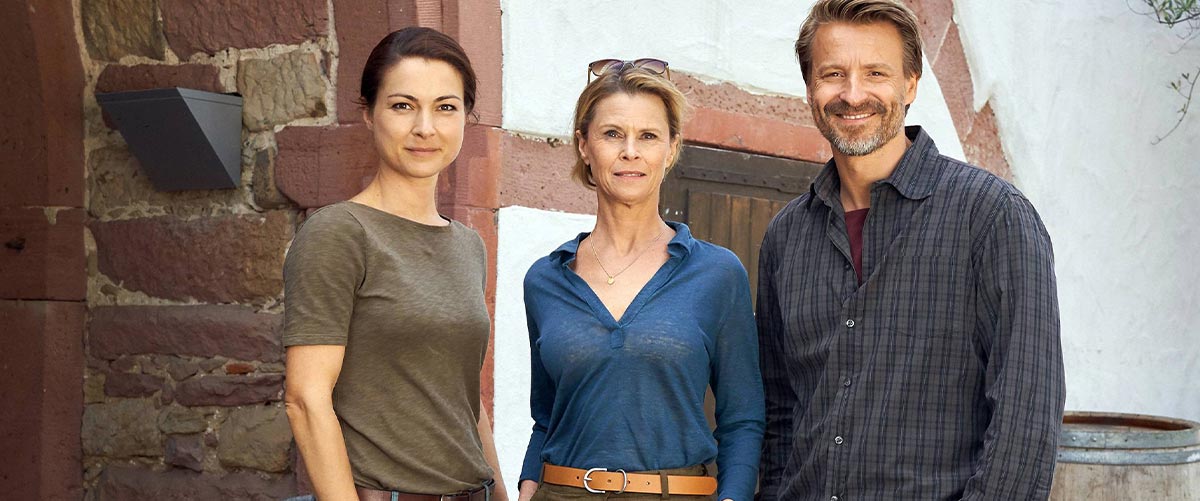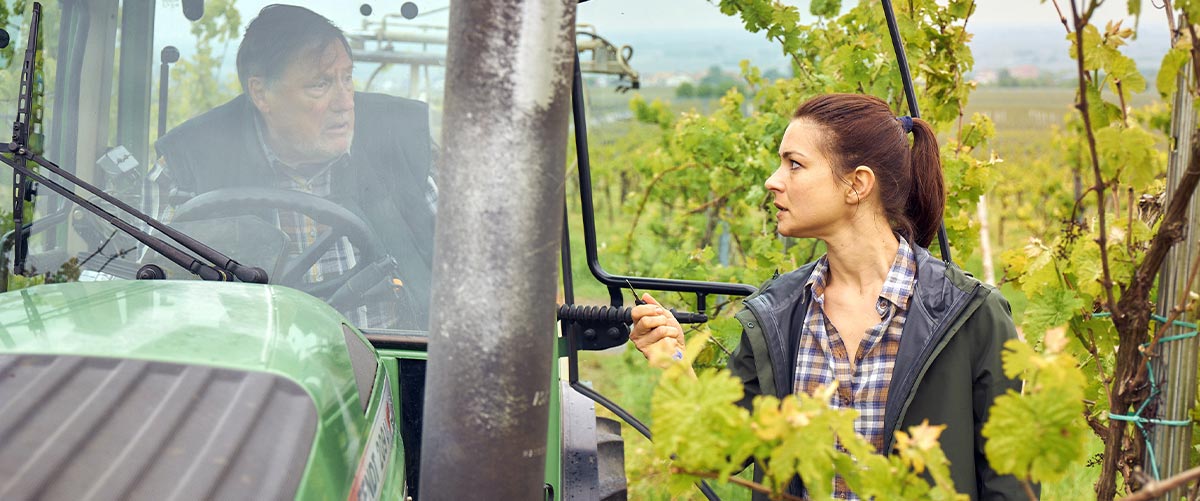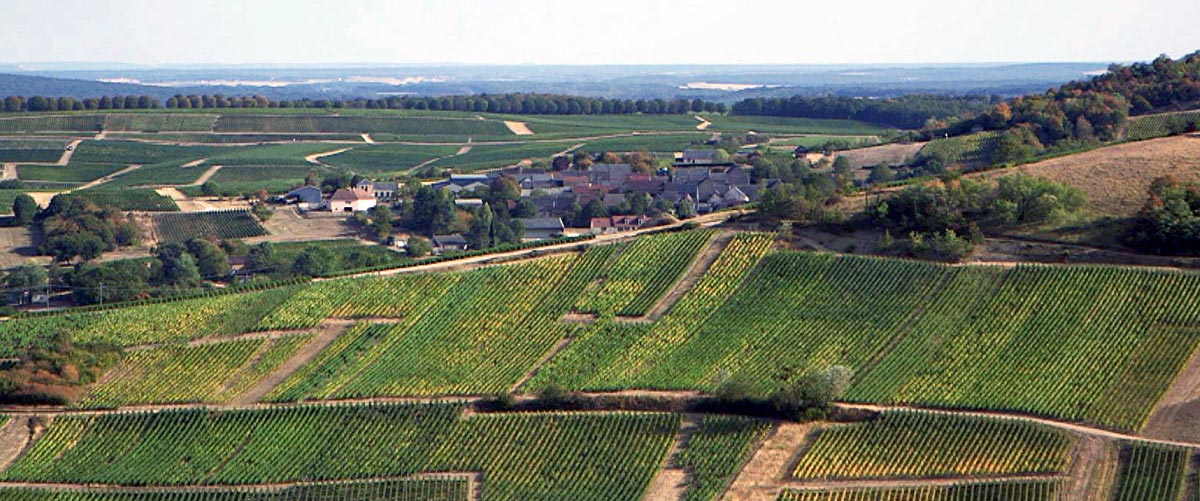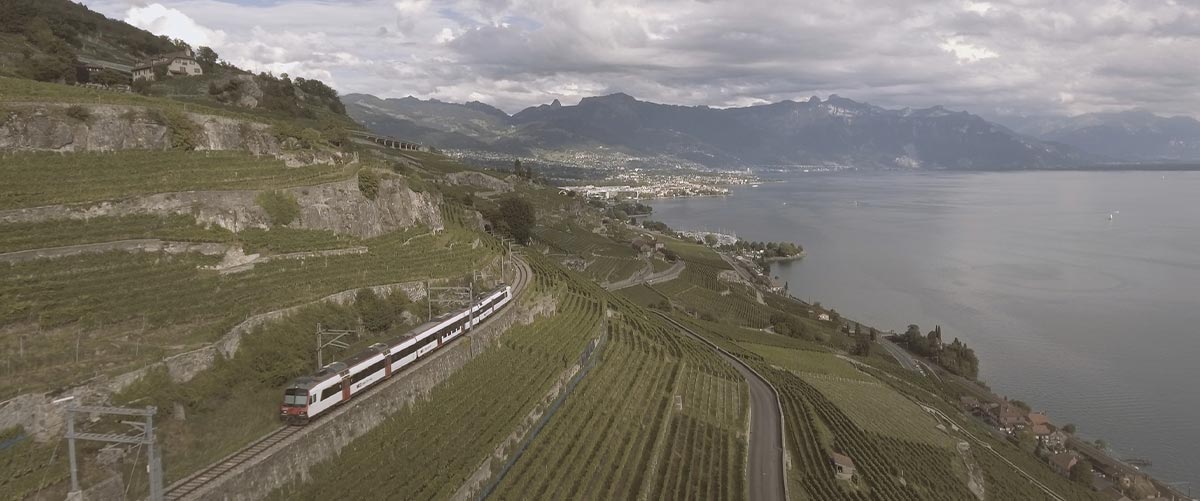arte, 8.10 a.m.
Beneath the karst fields of Popovo Polje lies one of Bosnia and Herzegovina's greatest treasures: mineral-rich underground cavities that allow the region's vines to grow and flourish. All the prerequisites were in place to make the wines something special. But then came natural disasters, wars and conflicts. That wines like Blatina and Zilavka still exist today is thanks to a handful of persistent and passionate men.
3sat, 11.55 a.m.
In this episode of "Lecker aufs Land" we go to Rheinhessen. There is wine on the estate of Maren Bornheimer-Schwalbach and her husband Bernd, but they also keep Bentheimer pigs.
3sat, 2.05 p.m.
Over the centuries, the inhabitants have developed amazing ingenuity to secure their income on the isolated islands. Many have multiple occupations, are musicians and cooks, winemakers and lobstermen, carpenters and shipwreck hunters.
.jpg) |
3sat, 5.45 p.m.
In the south of Italy, famous volcanoes and ancient buildings dominate the picture from the air. The journey leads from Sicily and Mount Etna to Rome, along dream beaches, olive groves and Roman roads. It is believed that wine has been growing on Etna for 20,000 years. Vines had already been cultivated before the Greeks conquered the island. The Greeks improved viticulture and imported new grape varieties such as Carricante, which has since become the most important white wine grape in the region under the name Grecanico.
HGTV, 9.35 pm
From viticulture to top cuisine: Josef Starkl visits the brothers Martin and Bertram Nigl at the family-owned winery with hotel and restaurant in the picturesque Kremstal valley in Austria. The Lesehof, which dates back to the 12th century, offers a special ambience: In the natural shade of tall trees, everything the master chef needs for his cuisine grows on the farm. The two brothers show Josef the Riesling vineyards around the estate and tell him about their family business and the proper storage of wine.
hr television, 8.15 p.m.
In Slovenia, Anne Willmes needs only two hours by car to get from the Adriatic to the Alps. But first she cycles along the 46-kilometre coast. Wine and olives thrive in the Mediterranean climate.
SWR Television, 9.00 a.m.
Ischia has always been an island to stay. Greek sailors landed here around 3,000 years ago (the real core of the "Odyssey"), founded a colony and planted their wine on the fertile volcanic soil.
SWR Television, 9.45 a.m.
In this report, the SWR television team accompanied a special train to Tuscany. It goes to the Crete Sienese, the wine cellar of Italy, from where Chianti and Montepulciano come or the Brunello di Montalcino. Finally, the special steam train takes its passengers to Rimini on the beaches of the Adriatic. Lonely and deserted, they lie in the magical light of a sunny October day.
SWR Television, 4.00 p.m.
South Tyrolean winegrowers, once simple folk, serve up sumptuous fare at their regional festivals and enjoy the local dishes. In Villnös in the Eisacktal region, the Speck Festival features the finest South Tyrolean bacon in many varieties. Bacon dumplings, napkin dumplings, grey cheese dumplings, plum dumplings and Lenten dumplings play the main role at the dumpling festival in Sterzing. South Tyrolean wine - Vernatsch, Lagrein or Terlaner - flows with them. They all thrive in the picturesque landscape around Lake Kaltern.
NDR Television, 7.00 p.m.
Presenter Laura Lange goes on a discovery tour on the Isles of Scilly. She visits passionate gardeners who tend cypresses, opulent cacti and exotic blossoms, meets a winegrower who produces Chardonnay in an unusual castle and explores lonely hiking routes and the most beautiful beaches in Great Britain while island-hopping.
Das Erste (ARD), 1.45 p.m.
For the Palatinate winegrower Anne (Henriette Richter-Röhl), things are tough right from the start as the new boss of the Wader wine estate. First she barely manages to save her vines during a frosty spell, then the supervisory authority closes down her business on suspicion of fraud. Only when it has been clarified whether three thousand litres of wine were sold under the table and who over-sulphurised the red wine in the tanks can production and sales continue. That takes time - and by then the Waders will probably be broke! Only when Anne's mother Käthe (Leslie Malton) stands up for the serious mistakes under her management is there a way out. However, the patriarch, who wanted to prove herself after the death of her highly respected husband, finds it difficult to sacrifice her reputation as a winemaker. Anne's uncle Bruno (Jürgen Heinrich) is faced with a professional and private shambles. After being thrown out by his wife Christel (Judith von Radetzky), who owns the second Wader vineyard, the formerly powerful winemaker is faced with nothing. In order to get back into business, he is willing to use any means. He lets himself be hired by Japanese investors to buy land on their behalf. Meanwhile, Anne's 17-year-old daughter Tori (Caroline Hartig), who wants to move to Mannheim with her boyfriend Philipp (Nikolas Weber) and study music, has to cope with a serious disappointment. When he drops out under pressure from his parents, Tory questions her great love.
 |
Das Erste (ARD), 3.15 p.m.
Anne (Henriette Richter-Röhl) is determined to convert the traditional family farm completely to organic viticulture. Her new methods - and especially the renunciation of pesticides - meet with resistance from her neighbours. The winegrowers fear not only pest infestation for their neighbouring vines, but also a loss of image for the tradition-rich winegrowing region. The dispute escalates when Anne's vines are damaged and she fires back at the opposition in an interview. Soon she is on her own. She is even threatened with expulsion from the winegrowers' association. This programme will be available in the ARD Mediathek for six months after broadcast.
 |
arte, 1.00 p.m.
The Loire is a mighty and wild river that lends its name not only to an entire stretch of land but also to famous wines. Without man there would be no vines, but without the river there would be no fertile soil. The gentle Loire Valley has many different grape varieties. This is not only due to the climate, but also to the enthusiasm that royal families from France and England have shown for the region.
 |
Bavarian Television, 10.45 p.m.
The popular holiday region of South Tyrol is nestled between the Eastern Alps and the Dolomites. Rugged mountains meet beautiful wine-growing landscapes, and the sun shines 300 days a year. Tyrolean down-to-earthness and Italian lightness go hand in hand here. By bike we explore the picturesque wine villages along the South Tyrolean Wine Road to Lake Kaltern.
Bavarian Television, 2.10 p.m.
Does a wine taste different when the lighting in the room changes from a pleasant red light to a glaring green?
arte, 4.10 p.m.
From enormous granite massifs to imposing mountain panoramas and impressive nature reserves: Valtellina is one of the most beautiful and yet least known Alpine regions in Italy. The northern Italian valley landscape stretches for over a hundred kilometres and is surrounded by steep vineyards that are painstakingly cultivated. With its dry stone walls - a masterpiece that has been declared a UNESCO World Heritage Site - Valtellina is a land of traditions and contrasts amidst breathtaking scenery.
3sat, 1.25 p.m.
Ufenau in Lake Zurich measures only eleven hectares, yet it is the largest island in Switzerland not connected to the mainland. An idyllic gem. For almost two years, the "Gaststätte zu den zwei Raben" remained closed for renovation work. In April 2018, it opened in a new splendour. Rösli Lötscher has been running the business for eleven years. For many, she is the face of Ufenau, always friendly, always open for a quick chat. In her restaurant she serves St. Martin's Featherwhite, a refreshing red wine made from grapes from the Ufenau, as well as her Fischknusperli, which enjoy an excellent reputation throughout the region.
3sat, 2.15 p.m.
Anyone who sees St. Peter's Island rising out of Lake Biel is impressed. The island already bewitched the philosopher Rousseau. To this day, it exerts a spell on its visitors. No matter whether you approach the car-free island on foot over the bridge, by bike or by boat: The island, just under two square kilometres in size, captivates with its wild nature. Besides nature lovers and gourmets, wedding parties are the main visitors. In the wooded main part of the island, where a hotel and an organic farm are the only building complex, farmer Markus Schumacher shows his Boer goats and Angus cattle. Next door, winegrower Hubert Louis presents his vineyard, probably one of the most beautiful workplaces in Switzerland.
3sat, 5.40 p.m.
Heading south, the train meanders leisurely through the Fribourg region. After the tunnel at Puidoux, a magical sight opens up to the train passenger: The vineyards of Lavaux in the foreground, Lake Geneva shimmering blue behind, and the snow-covered slopes of majestic Mont Blanc in the distance. The vineyard terraces of Lavaux have been a UNESCO World Heritage Site since 2007. Christelle Conne's family has run a vineyard here for generations and allows the film team a look behind the scenes.
 |
arte, 4.55 p.m.
Millions of grapevines reach for the sky on the gentle hills of the Argentine province of Mendoza. Centuries ago, the Incas established irrigation systems here to transport the meltwater from the mountains down into the valley.
hr television, 9.45 p.m.
Film author Monika Birk discovers the Baden way of life in the Black Forest metropolis and beyond. For right on Freiburg's doorstep lies the Kaiserstuhl region with its pretty winegrowing villages.
WDR Television, 12.45 p.m.
Pico, named after the 2,351 metre high volcano Ponta do Pico, is the island of wine and whales.
SWR Television, 8.15 p.m.
Only a few people know the mountainous region between the cultural cities of Bologna and Florence. The 20-year-old winegrower Andrea Barrani dreams of producing wine on the slopes of the Cinque Terre.
3sat, 3 .30 p.m.
The Tagliamento flows out of the mountains near Gemona into the plains of Friuli. Further downstream, winemaker Emilio Bulfon has found the best conditions for cultivating autochthonous grape varieties on the hills and terraces along the river.
SWR Television, 1.45 p.m.
It is the drink of the rich and beautiful, the powerful and successful - no other sparkling wine is as symbolic of a sophisticated lifestyle as champagne. What is hardly known is that the history of champagne has long been a Franco-German one. Many young German pioneers such as Florenz-Ludwig Heidsieck from Borgholzhausen or Joseph Jacob Bollinger from Ellwangen settled in Champagne in the 18th and 19th centuries, made a name for themselves there and played a decisive role in shaping the production method, distribution and image of champagne. They also brought the method and name to Germany, because champagne was not yet a protected brand name. It was not until the wars of the 19th and 20th centuries that peaceful coexistence came to an end. Example: the "Champagne Clause" in the Treaty of Versailles. This is why the name "Mumm" today stands for both a French champagne brand and a German sparkling wine brand.
SWR Television, 2.15 p.m.
The hanging gardens of Marqueyssac tower above the wide valley on a rocky plateau, while the Dordogne flows gently west below. The tradition of the Jurade is still cultivated in Saint-Emilion today, for the famous wine village once belonged to the Kingdom of England. Young surfers ride a short distance back towards the source.
SR Television, 6.15 p.m.
Old fruit and vegetable varieties, handmade food without industrial additives and traditional recipes: More and more people are turning to what grows in their region. In the Palatinate Forest, too. On its eastern edge, where it merges into the Upper Rhine Plain, it is so mild that the Romans started growing grapes. Even fig trees thrive. Yvonne Ortloff in Bad Dürkheim makes mustard from figs and Riesling. A local farmer grows mustard plants especially for her. Even the salt is boiled on the grading wall of the spa. The Americans stationed in the Palatinate love to celebrate Halloween. That's why they asked Daniel Fischer from the Hitscherhof to grow Halloween pumpkins for them. In the meantime, he harvests many varieties of edible pumpkins in autumn. In winter, many residents used to plant walnut trees there. Today there are still about 140 trees - Großbundenbach is a walnut village.
ZDF info, 6.45 p.m.
Germans love wine - especially when it is cheap. Almost half of all wine is now sold in discounters. Wine production and sales are a global business. With downsides for the environment and workers. The most popular imported wine from overseas is wine from South Africa. Good and cheap - that is the image. But the strong pressure on prices causes untenable conditions on South African wineries. Wine from the Bordeaux region is also appreciated in Germany. Germany imports around 15 million litres per year. Many French winegrowers, however, only achieve the quality they are used to with pesticides that can still be detected in the wine. In Germany, too, the image cultivated by winegrowers of a noble, pure drop is only part of the reality. For in addition to pesticides in the vineyard, more than 50 additives may now be used in the wine cellar after the harvest. By no means all of them are harmless. The documentary by Anna Fein, Erik Hane and Stefan Hanf explores the consequences of the globalisation of the wine market for people and nature. The authors are on the trail of the darker side of wine. They research the working conditions at South African wineries. They talk to scientists about the use of synthetic pesticides and fining agents in viticulture. They visit an organic winegrower in the Bordeaux region who tries to produce high-quality wines in the most natural way possible.
hr television, 8.15 p.m.
The popular holiday region of South Tyrol is nestled between the Eastern Alps and the Dolomites, where rugged mountains meet beautiful wine landscapes, where the sun shines 300 days a year and where Tyrolean down-to-earthness and Italian lightness shake hands. By bike, you can explore the wine villages along the South Tyrolean Wine Road all the way to Lake Kaltern. And those who cycle can also taste wine with a clear conscience.
NDR Television, 8.15 p.m.
Farming on Amrum! What sounds so harmonious has become a daily struggle for economic existence. Without new ideas, the Martinens would have to give up their farm. Oke and his father Irk Martinen have almost as many ideas as problems. Together with a winegrower from the Rheingau, they want to turn a former potato field into a vineyard and plant 10,000 vines there. The grapes are to be protected from the geese by wire netting.
SWR Television, 4.30 p.m.
The makers of the craft beer scene are independent and unconventional. "Craft" means craft. It's about craft beer brewed by hand. Craft beer - the big trend in the brewing scene. They want to make different beer than the brewing corporations. For them, the German Purity Law is not an immutable law. The brewers are creative and keen to experiment. Taste and unusual brewing styles are trumps. "Essgeschichten" has accompanied craft beer brewers in their production: Small entrepreneurs who fight for their cause. They have to, because they want to make a living from craft beer. Michael Heuser from Mogendorf in the Westerwald runs his "Munruffer Bierfabrik" as a one-man business. Mathias Krämer and Markus Adler produce with their "Brauart Sausenheim" from the Palatinate - one of the largest wine-growing regions in Germany - in a former winery. A new craft beer brewery has been established in Mainz: At 1.4 million euros, "Kuehn Kunz Rosen" are digging deep into their pockets. They are all "beer revolutionaries" who work with heart and soul - but how does the beer taste?
3sat, 11.45 a.m.
For the Swiss Gernet family, at home on Crete for over 20 years, the journey takes them from the sleepy village of Kroustas to Agios Nikolaos. Always on the lookout for new bike trails, they cycle cross-country through the vineyards.
3sat, 7.30 pm
The film introduces people who appreciate the special features of the islands: a biologist who works for the national park "Tuscan Archipelago", a beekeeper, a former professional cyclist and a vintner who grows the typical sweet wine of Elba.
arte, 5.50 p.m.
The volcanic island of Pantelleria lies between Sicily and Tunisia and is also called the "black pearl of the Mediterranean" because of its beauty. Everything on the island seems to duck from the winds: olive trees, vines and houses.
arte, 5.50 p.m.
In the middle of Lake Iseo, surrounded by a mountain panorama up to 2,000 metres high, lies Monte Isola. There are about 17,000 olive trees on the island, the most northerly in all of Italy. This is due to the particularly mild microclimate of the lake at the foothills of the Alps. It also favours viticulture on the southern shore. The Franciacorta sparkling wine, which was created here in the 1960s, is now sought after worldwide.
3sat, 3 .45 p.m.
Twenty kilometres north of Niagara Falls, where the Niagara River flows into Lake Ontario, lies the Niagara wine region with the small historic village of Niagara-on-the-Lake. There it seems as if time stands still. It is a region known for Canada's famous ice wine. The "Inniskillin" winery in the province of Ontario has often been awarded for its top wines.
arte, 13.10
Available online from 20/06 to 20/07 The volcanic island of Pantelleria lies between Sicily and Tunisia and is also called the "black pearl of the Mediterranean" because of its beauty. Everything on the island seems to duck from the winds: olive trees, vines and houses.
arte, 14.40
In the middle of Lake Iseo, surrounded by a mountain panorama up to 2,000 metres high, lies Monte Isola. There are about 17,000 olive trees on the island, the most northerly in all of Italy. This is due to the particularly mild microclimate of the lake at the foothills of the Alps. It also favours viticulture on the southern shore. The Franciacorta sparkling wine, which was created here in the 1960s, is now sought after worldwide.
arte, 9.45 a.m.
Percheron horses have always been indispensable in agriculture in north-west France. These large, powerful animals ploughed the fields, pulled logs out of the forests and stagecoaches across the country. Only in recent years has the breed experienced a renaissance. A change in environmental awareness has made many people in the countryside turn to these enduring and good-natured powerhouses again. Percherons help in tilling fields, harvesting, clearing forests and also in winegrowing.
3sat, 1.15 pm
Tuscany can also be tasted. This is true for Chianti with its famous wines and for Maremma and its good cheese.
arte, 8.15 p.m.
On the evening of 14 July 2021, a flood wave causes the Ahr river in Rhineland-Palatinate to swell to over seven metres. The film follows the people along the Ahr and shows in previously unpublished footage how they experienced the catastrophe, as in the case of Alina Sonntag, who desperately tried to save the winegrowers' cooperative in Mayschoß.
3sat, 5.00 p.m.
Many inhabitants of the islands have several occupations, are musicians and cooks, winemakers and lobster fishermen, carpenters and shipwreck hunters.
arte, 12.25 p.m.
The wine-growing areas around Etna are famous because excellent grapes thrive on the mineral-rich soils.
Available online until 30.12.2022
Vines, wine and winegrowers shape the culture and landscape of the southwest. Rhineland-Palatinate and Baden-Württemberg are the homelands of German wine. In people's minds, this is a significant factor. For the first time, a 90-minute television documentary comprehensively reflects this - with pictures and archive footage, some of which is almost 100 years old. The SWR documentary also shows the once hard manual labour of the winegrowers and the development of viticulture up to the present day.